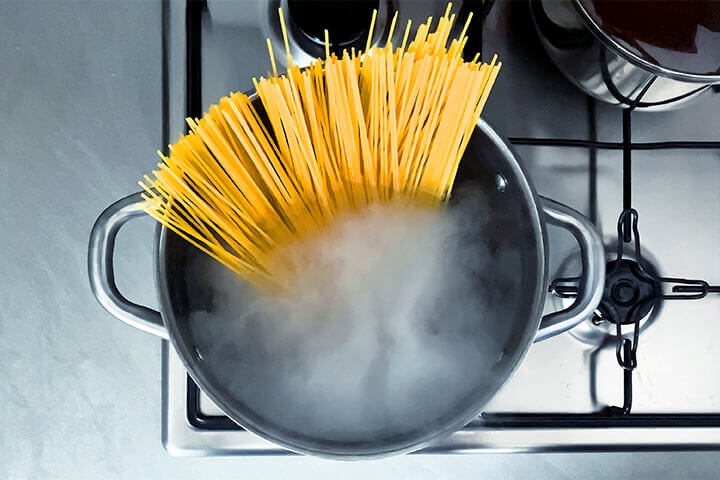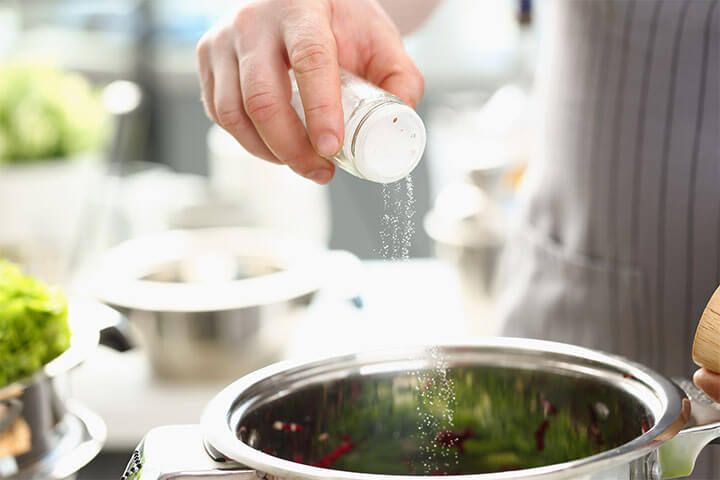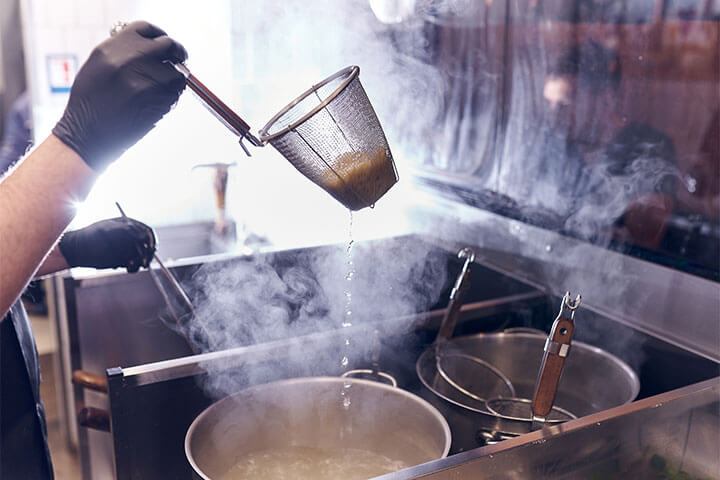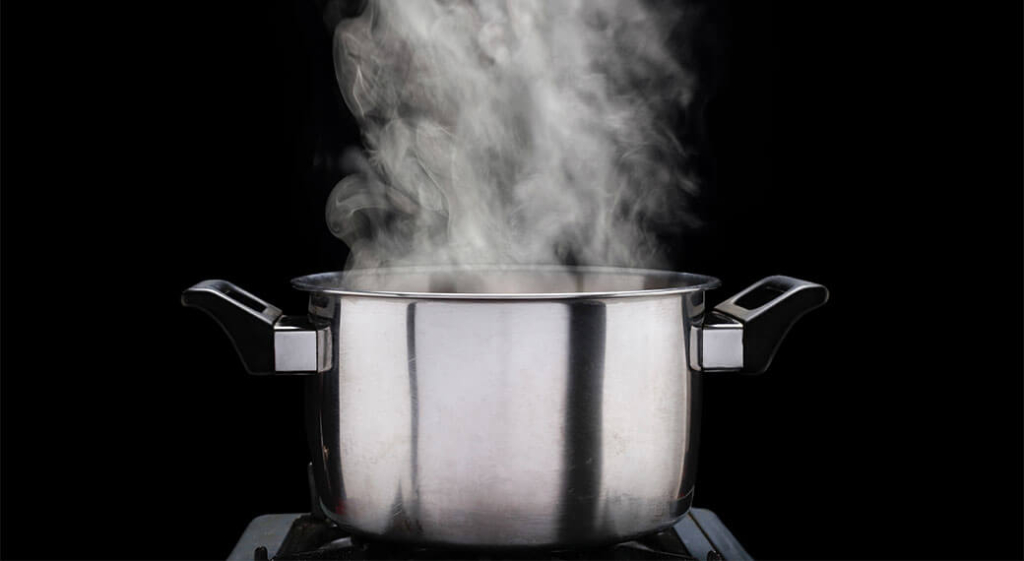Tired of that one line cook who would die on the “cold water boils faster than hot water” hill? In this article, we provide science-based information to settle this common BoH debate including where the cold-water rumor originated, as well as some tips on how to speed up your boil.
Which Boils Faster: Hot Water or Cold Water?

Cold water does not boil faster than hot water. Simply stated, the primary factor affecting the rate at which water boils is the temperature difference between the water and its surroundings, typically the heat source (e.g., a stove). Water boils when it reaches 212°F (100°C) at standard atmospheric pressure. Hot water is closer to the boiling point, so it actually takes less energy (heat) to raise it to the boiling point compared to cold water. Cold water needs more time and energy input to reach its boiling point, so it doesn’t boil faster.
How Did This Misconception Originate?

The misconception that cold water boils faster most likely originated with the Mpemba Effect.
What Is the Mpemba Effect?
When Erasto B. Mpemba (1950–2023) was a student in Tanzania in the early 1960s, he was tasked with making ice cream as part of a class project. During this project, he noticed an unusual phenomenon: Mpemba had boiled milk and sugar, creating a hot mixture, and then he needed to cool it down before freezing it into ice cream. Instead of letting the mixture cool to room temperature, he placed it in the freezer when it was still hot.
To his surprise, the hot mixture froze faster than the cold mixtures prepared by his classmates. Mpemba’s observation of this seemingly counterintuitive effect piqued his curiosity, and he sought to understand why it happened.
Erasto B. Mpemba’s observations eventually garnered attention in the scientific community, and his story was shared in a scientific paper titled “Cool?” This paper described his experiments and findings related to the Mpemba effect, which brought the phenomenon to a wider audience.
It’s worth noting that the Mpemba effect is complex and not fully understood. While it has been observed in various experiments, the specific conditions and mechanisms responsible for the effect can vary. Scientists continue to study and explore the phenomenon to gain a deeper understanding of the factors at play when hot water appears to freeze faster than cold water.
How Does the Mpemba Effect Relate to the Misconception That Cold Water Boils Faster?
The Mpemba effect is related in the sense that both phenomena challenge our common-sense expectations about the behavior of hot and cold water.
In both cases, these misconceptions stem from an incomplete understanding of the complex thermodynamic processes involved when water changes its temperature. The Mpemba effect and the cold water boiling misconception highlight the importance of considering the specific conditions, heat transfer mechanisms, and phase changes when dealing with the behavior of water at different temperatures.
What Is the Fastest Way to Boil Water?

The absolute fastest way to boil water depends on several factors, including the equipment you use, the starting temperature of the water, and any additional substances you add. Here are some considerations for boiling water quickly:
Choose the Right Equipment
Induction cooktops are generally faster at boiling water compared to traditional electric or gas stovetops. Induction cooktops directly heat the pot or pan using magnetic fields, making them a highly efficient choice.
Use Hot Water
As we’ve mentioned, using hot or warm water will decrease the time it takes to reach a boil. Cold water requires more energy to raise its temperature to the boiling point. Also, if possible, use less water.
Put a Lid on It
Using a lid on your pot helps to retain heat and reduce the time it takes to boil water. A covered pot will trap heat, allowing the water to heat up faster.
Stir the Pot
Agitating the water by stirring it can help distribute heat more evenly, potentially speeding up the boiling process. Speaking of pots, using high-quality commercial cookware with good heat conductivity helps to distribute heat more efficiently and speed up boiling.
Take It With a Grain of Salt
Contrary to a common myth, adding salt to water will not make it boil faster. In fact, it can slightly increase the boiling point of water due to the effect of colligative properties. So, adding salt to water is more about seasoning it than speeding up the boiling process.
The Bottom Line: Hot Water Boils Faster

If your goal is to boil water as quickly as possible in a commercial kitchen, using an induction cooktop is likely your best choice. Starting with hot or warm water can help, but the time saved may not be significant. While some of the other factors mentioned can contribute to faster boiling, their impact is generally minimal compared to the efficiency of the heating method itself.
We hope this article shed some light on the common misconception that cold water boils faster. What topics are often debated in your BoH? Let us know in the comment section!




When I was a child, and my mouth had blisters for one reason or another, my mom made me rinse my mouth with warm/hot salt water. I remember that I could run the hottest tap water which I could get, and as soon as I added the salt, the water became cooler, so I’d add more hot water, but then i’d have to add more salt, but if I used the same temperature of hot water by itself, it would be really hot. I recently had a sore developing on my tongue, so I tried the salt water, and the results were the same as I remember from years ago. Why?
Hi Maryann, thank you for your question! While you may want to enquire with an official scientist for the most accurate answer, we have a few ideas:
When salt is added to hot water, it needs to dissolve which involves the salt particles breaking apart and surrounding themselves with water molecules. During this process, some of the water’s thermal energy gets used to break the salt’s structure.
This tiny change in thermal energy isn’t enough to make the water objectively colder, but it is enough to trick our body into feeling a cooler sensation compared to the initial hot water alone.
In any case, it’s wise of you to use a soothing salt water rinse as they help reduce inflammation. Thanks again!